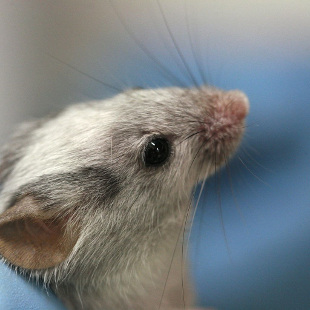Changes in gene methylation alone can trigger cancer, according to a mouse study published today (July 25) in the Journal of Clinical Investigation. Working in mouse stem cells, researchers from Baylor College of Medicine in Houston, Texas, introduced a genetic segment designed to attract methyl groups chemical modifiers that lead to gene silencing into the mouse genome, upstream of the gene p16, which normally functions to regulate cell division. This transgenic segment was made up of motifs from the human genome, which as a previous studyhas shown are associated with promoter methylation and gene silencing during human development.
Baylor’s Lanlan Shen and her colleagues have now shown that among mice in which this methylation magnet was introduced, 27 percent developed lung cancer, leukemia, or sarcomas, while wild-type controls did not develop tumors. Five percent of mice that inherited one copy of the transgene and one wild type copy also developed tumors.
“For many years we’ve been very convinced that DNA methylation changes and epigenetic silencing contribute to human cancer, and there have been a lot of observations that support that concept,”Peter Jones, research director and head of the cancer epigenomics lab at Michigan’s Van Andel Research Institute who was not involved in the work, told The Scientist. “What [this] paper does, which I think is very clever, is to selectively silence a tumor-suppressor gene that’s the p16 gene in a mouse model system and then show that those mice do develop cancers. This shows that epigenetic silencing can lead directly to the formation of cancer.”
“There are several lines of evidence suggesting the important role of epigenetics in cancer, including the fact that all cancers show epigenetic change, and most cancer mutations affect the epigenome,”Andrew Feinberg from the Johns Hopkins School of Medicine Center for Epigenetics in Baltimore, Maryland, told The Scientist in an e-mail. Feinberg added that while this study is not the first to show than epigenetic changes alone can cause cancer, it “adds one more valuable image to the big picture.”
For at least a decade, the number of known associations between epigenetic changes and cancer has been growing. Abnormal methylation can be found in most cancers, and mutations in the enzymes that add methyl groups to DNA have been associated with some cancer types. In most human cancers, Shen said, the promoter of p16 contains methylated cytosine residues. However, it had been unclear whether p16 methylation and silencing were a cause of cancer or a consequence of it.
In mouse embryonic stem cells, the researchers found that the methylation-inducing transgene construct upped methylation at the p16 promoter and decreased p16 transcription, compared to a control transgene. The difference in methylation between the control and experimental groups emerged after stem-cell differentiation, which was expected, since the transgene motifs regulate methylation during development in humans, Shen said.
Additionally, model mice born with the methylation-inducing transgene developed more tumors and lived shorter lives than control mice, in addition to exhibiting p16 promoter methylation and gene silencing.
“This is the first demonstration that gene promoter methylation can actually cause cancer,” said Shen.
However, Richard Meehan, who studies epigenetics in development and disease at the University of Edinburgh, argued that the paper does not directly demonstrate cause and effect. The authors, Meehan wrote in an e-mail to The Scientist, did not expressly show that altered methylation and not some other means of transcriptional repression also associated with the transgene initiated gene silencing.
Asked whether the results showed that the methylation, and not some other effect of the transgene insertion, caused cancer, Jones said: “The idea of using a sequence which attracts methylation and shows that this gives rise to an increase in tumorigenesis, I think, is pretty solid evidence.”
“It’s a very clever paper,” added Jones. “I think the results are very clean and clear. It’s a gene [that] is known to be methylated,” Jones said, referring to p16. “It’s known to be methylated very early in the cancer process. In the test tube, [my lab has] shown directly that the methylation of this particular region silences the gene, so I think all the dots have been connected and this was just a final cherry on the top of the cake, so to speak, to show this causality.”
“It certainly shows that the methylation of the gene and losing the gene this way is important to something that happens that might be permissive to cancer or sets up some early changes,” saidStephen Baylin, deputy director of the Sidney Kimmel Comprehensive Cancer Center at the Johns Hopkins School of Medicine. Baylin noted that it was possible that other mutations might also have contributed to tumorigenesis.
Shen said she hopes that her team’s results point the way to future treatments. Now that promoter methylation has been shown to cause cancer, Shen is optimistic that reversal of methylation using commercially available demethylating agents might be a mechanism for cancer treatments in the future.







